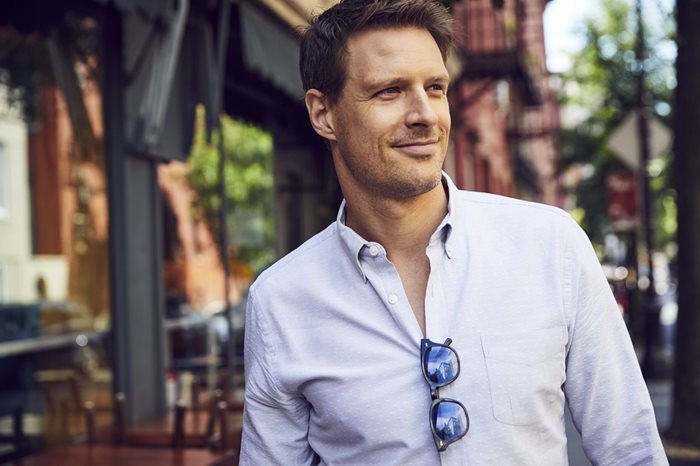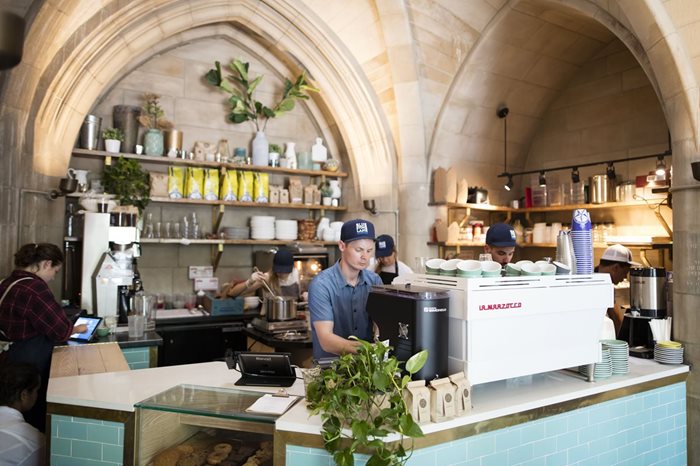World Coffee Portal speaks to Bluestone Lane founder and CEO, Nicholas Stone, about importing Australian hospitality to the US and why delivering human connections is the secret to success in his fast-growing business
 “Prior to launching Bluestone Lane in 2013, I’d never worked a day in hospitality – I’d certainly never worked in a coffee shop.” - Nicholas Stone, CEO, Bluestone Lane
“Prior to launching Bluestone Lane in 2013, I’d never worked a day in hospitality – I’d certainly never worked in a coffee shop.” - Nicholas Stone, CEO, Bluestone Lane
Acclaimed author and leading thinker, Malcolm Gladwell, writes in his book
Outliers that some of the most successful entrepreneurs are outsiders. They have little or no experience inside their chosen industry, they don’t obey the rules and often don’t take advice. Put simply, the outlier entrepreneur propels their big idea forward without becoming mired in preconceptions.
The outlier profile could be applied to Bluestone Lane CEO Nicholas Stone. A former investment banker turned 5th Wave entrepreneur, Stone made his first foray into hospitality as a side project while still at business school. “Prior to launching Bluestone Lane in 2013, I’d never worked a day in hospitality – I’d certainly never worked in a coffee shop,” he reveals.
Stone reminisces that the highlight of a hectic day in investment banking was often walking into his neighbourhood café for the simple pleasure of human connection – where a familiar face would know your order and you’d feel at home. “Bluestone Lane started as an idea to export what I believe Australia does better than anyone: localising their customer base,” says Stone.
“When I moved to New York in 2010, one of the first things that struck me was that people had warm relationships with their dry cleaners, at their salon or local bar – but they didn’t have it with coffee, it was just transactional. That’s very different to where I come from in Australia and the acceleration of boutique businesses in the US ties into that.”
 Bluestone Lane’s Upper East Side store, New York. Photo credit: Ben Hider Photography
Bluestone Lane’s Upper East Side store, New York. Photo credit: Ben Hider Photography
Personalised in-store experiences are the trademark of independent café culture and a concept larger chains have struggled to replicate across large portfolios. Many artisan businesses consider ‘boutique at scale’ an oxymoron, but in identifying a gap in the market for human transaction, that’s exactly what Stone has achieved at Bluestone Lane. “The perception that when you’ve gone from five to ten stores you’ve gone commercial and sold-out has always fascinated me”, says Stone. “It’s absolutely absurd when you consider how big the market is.”
Since 2013, the Melbourne-inspired café and coffee shop concept has become one of the fastest-growing boutique hospitality businesses in US, with 41 stores and plans for further expansion in the pipeline. This year saw the launch of their first international café in Toronto. In July 2018,
Bloomberg reported the café and coffee shop businesses had reached a rumoured $100m valuation after attaining a significant investment from private investment firm RSE Ventures to grow the business in the US.
Uniformity is the most important factor in scaling a brand. There’s no brand if there’s no store cohesion
Specialty coffee, artisan food and personalised service packaged in seamless, tailored in-store environments are central to Bluestone Lane’s neighbourhood café concept. But it’s the art of knitting these boutique elements together across a scaled store portfolio that keeps successful 5th Wave execution to a select handful of operators.
“Uniformity is the most important factor in scaling a brand,” says Stone. “There’s no brand if there’s no store cohesion. If one store has fast, convenient coffee and the other doesn’t, that’s not a brand, it’s just an unsustainable aggregation of stores,” he explains.
“We took a curated store concept and shaped it for the US consumer. For us, that uniformity is defined very easily – premium, consistent, coffee, tea and fresh food with personalised service and the notion of local reciprocity. That means we want to know your name, face and order and we want our locals to know our staff.”
And it’s this reciprocal relationship that not only encourages customers to become regulars but generates greater purpose and loyalty among staff. “You cannot be sustainable with a customer acquisition model,” urges Stone.
The Lean, Mean, Boutique Machine
In today’s diverse coffee shop market, Melbourne-inspired coffee and brunch is hardly a unique proposition, but it’s the scale of Stone’s ambition that sets his brand apart from the competition. Bluestone Lane is often compared to similar-sized competitor, Blue Bottle – “perhaps it’s because we’ve both got ‘blue’ in our names,” laughs Stone. But he prefers to benchmark his business against the only brand that no one’s even close to catching up to – Starbucks.
“We’ve educated ourselves by delving deep into Starbucks’ success. There’s no doubt in my mind that Howard Schultz designed Starbucks to be a scaled boutique enterprise in those first 10 years. But it was so successful they decided to scale it to a $100bn company. The fact they achieved that within 30 years is extraordinary,” he says.
That’s why for Stone, truly scaling boutique hospitality means having a 1,000-store portfolio. To achieve this, he’s deployed rigorous financial discipline honed from his previous life as an investment banker. A dispassionate financial approach to scaling the business has been a vital part of Bluestone Lane’s success. In fact, Stone reveals his business was able to scale to 12 stores within three years with less than $2m investment, a rare feat among independent coffee shops.
By the end of 2019, Stone expects his boutique brand to reach 60 stores, something he says will have been achieved with around just one quarter of the capital Blue Bottle raised prior to being sold to Nestlé and a third of that raised by LA-based chain, Philz Coffee. “I’m a big believer in running a capital efficient business. That’s because my background is in business and not necessarily hospitality,” says Stone. And Bluestone Lane’s strategy seems to be working. In 2018, the business achieved 90% sales growth and is expecting a further 80% revenue growth in 2019.
People have the power
There’s no doubt Bluestone Lane’s rapid growth is testament to the popularity of its boutique proposition. But the brand’s 41 stores are the tip of the iceberg when it comes to Stone’s ambitions to scale the brand. The first years of success have put the business through a crucial baptism of fire in the highly competitive US coffee shop market. But making customers feel like each of Bluestone Lane’s growing portfolio can be their very own neighbourhood café is where the future hard work lies. To achieve this, the business, like all in the hospitality sector, must address that perennial industry challenge; finding and maintaining quality staff.
You can have the best coffee profile and real estate, but the service element is the reason people pay for hospitality
“We’re now at 500 employees and that’s creating extraordinary challenges on the business,” says Stone. “Every time you serve a customer it has be the same level of perfection across your entire portfolio. If one element is slightly off, then in my view you’ve failed at scaling. You can have the best coffee profile and real estate, but the service element is the reason people pay for hospitality.”
And while no operation can be perfect 100% of the time, another challenge for brands trading on quality is the vast presence of social media. With a smart phone in every hand, even the smallest error, no matter how tenuous, can be magnified many times on the social networks of a dissatisfied customer. “People can asymmetrically denigrate you for getting one thing wrong – they can tell everybody – it is extremely challenging,” reflects Stone.
Staffing pressures, such as diminishing talent pools and rising minimum wage are also big factors driving more automation across the hospitality industry. For today’s hospitality businesses, super automatics, vending machines and mobile ordering represent cost-effective ways to scale store portfolios without spending resources on staff. That’s why Stone believes the convenience hospitality segment is ripe for massive disruption by automated technology. “It’s just a matter of time before existing business models are displaced by a cheaper cost structure that doesn’t rely on the people element,” he says.
But even more complex propositions, such as latte art and food preparation, could be displaced as technology becomes more sophisticated. Indeed, the human element in scaled hospitality is increasingly costly to get right – and easier than ever to replace. In 2018, automated café concept, Café X raised over $10m to expand its US business, while, Allegra research shows nearly half of US consumers surveyed preference speed of service over receiving a hand-crafted beverage.
“The investment required to be boutique is so much higher than if you simply want to franchise or mass roll out with automated machines and remove the service element – which undoubtedly we’re going to see,” says Stone.
 Grassroots promotion for the Bluestone Lane's West Hollywood Flower Shop café opening
Grassroots promotion for the Bluestone Lane's West Hollywood Flower Shop café opening
While commodity and convenience-driven businesses could become playgrounds for disruptive technology, Stone asserts the boutique segment is not as susceptible to automation. “Boutique businesses will survive, not because they serve great coffee, but because they provide community. That’s what I truly believe is going to continue accelerating in the US – that’s the opportunity. Bluestone Lane doesn’t think of itself as a hospitality, coffee or food company – we’re purely in the human connection game,” says Stone.
The 5th Wave Formula
Driven by younger consumers demanding flexible, tailored and digitally-enhanced store experiences, the growing allure of experiential and tailored hospitality concepts in the US is clear. It’s a trend evident in Bluestone Lane’s phenomenal ascension, but also the huge investments courted by fellow boutique brands. German conglomerate JAB Holdings has already built a sizable empire of premium US brands, including Peet’s Coffee, Caribou Coffee, Stumptown and Intelligentsia. Nestlé’s majority stake acquisition of Blue Bottle in 2017 further exemplifies the business potential of the burgeoning 5th Wave segment.
So, with scaling boutique coffee and hospitality an attractive and potentially lucrative venture, what advice would Stone give to those thinking of scaling their boutique brand? “My honest belief is if you love working with and want to associate with people all day, every day, then you can probably run one store – but it’s no easy task scaling to two, three, four and five outlets. I frequently see a pattern where a successful independent expands to a second site which isn’t quite as good as the first. Then sales at the first store begin to flatline, store number three opens and the second fails. Then the third fails, the company can’t raise any more capital and it’s game over.”
When it comes to scaling boutique hospitality, Stone affirms he’s not the definitive expert. But the playing field is somewhat levelled by the fact that even huge multinational corporations have yet to develop a definitive 5th Wave formula. For now, this most enigmatic of business models lies in the hands of a handful of skilled brands operating at the cutting edge of coffee industry innovation.
“Scaling boutique is challenging. We’re not doing it perfectly, but we’re not going to give up,” says Stone.
Nicholas Stone is Founder and CEO of Bluestone Lane